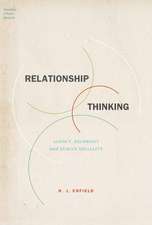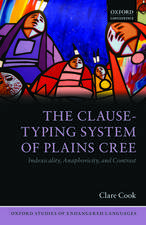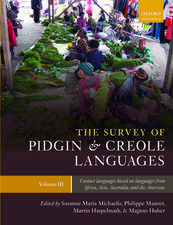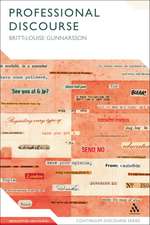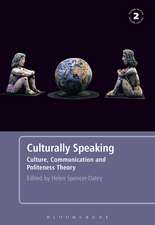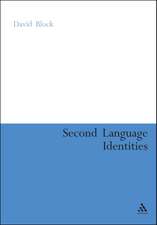Language, Culture and Identity: An Ethnolinguistic Perspective: Advances in Sociolinguistics
Autor Philip Rileyen Limba Engleză Hardback – 22 iun 2007
| Toate formatele și edițiile | Preț | Express |
|---|---|---|
| Paperback (1) | 436.25 lei 43-57 zile | |
| Bloomsbury Publishing – 22 iun 2007 | 436.25 lei 43-57 zile | |
| Hardback (1) | 1066.97 lei 43-57 zile | |
| Bloomsbury Publishing – 22 iun 2007 | 1066.97 lei 43-57 zile |
Din seria Advances in Sociolinguistics
- 30%
 Preț: 569.45 lei
Preț: 569.45 lei - 8%
 Preț: 301.09 lei
Preț: 301.09 lei -
 Preț: 193.14 lei
Preț: 193.14 lei - 43%
 Preț: 634.71 lei
Preț: 634.71 lei - 13%
 Preț: 257.41 lei
Preț: 257.41 lei - 23%
 Preț: 190.41 lei
Preț: 190.41 lei - 26%
 Preț: 265.10 lei
Preț: 265.10 lei - 22%
 Preț: 259.34 lei
Preț: 259.34 lei - 22%
 Preț: 231.34 lei
Preț: 231.34 lei -
 Preț: 257.41 lei
Preț: 257.41 lei - 23%
 Preț: 198.30 lei
Preț: 198.30 lei - 22%
 Preț: 224.48 lei
Preț: 224.48 lei -
 Preț: 258.15 lei
Preț: 258.15 lei - 22%
 Preț: 260.43 lei
Preț: 260.43 lei - 13%
 Preț: 256.20 lei
Preț: 256.20 lei -
 Preț: 257.50 lei
Preț: 257.50 lei - 22%
 Preț: 230.79 lei
Preț: 230.79 lei -
 Preț: 217.07 lei
Preț: 217.07 lei - 23%
 Preț: 222.19 lei
Preț: 222.19 lei - 23%
 Preț: 197.05 lei
Preț: 197.05 lei - 24%
 Preț: 375.17 lei
Preț: 375.17 lei - 31%
 Preț: 1067.52 lei
Preț: 1067.52 lei - 13%
 Preț: 258.42 lei
Preț: 258.42 lei -
 Preț: 258.59 lei
Preț: 258.59 lei - 19%
 Preț: 467.50 lei
Preț: 467.50 lei - 9%
 Preț: 296.91 lei
Preț: 296.91 lei - 30%
 Preț: 775.83 lei
Preț: 775.83 lei - 13%
 Preț: 258.42 lei
Preț: 258.42 lei
Preț: 1066.97 lei
Preț vechi: 1240.66 lei
-14% Nou
Puncte Express: 1600
Preț estimativ în valută:
204.17€ • 213.70$ • 169.93£
204.17€ • 213.70$ • 169.93£
Carte tipărită la comandă
Livrare economică 31 martie-14 aprilie
Preluare comenzi: 021 569.72.76
Specificații
ISBN-13: 9780826486288
ISBN-10: 0826486282
Pagini: 276
Dimensiuni: 156 x 234 x 27 mm
Greutate: 0.57 kg
Editura: Bloomsbury Publishing
Colecția Continuum
Seria Advances in Sociolinguistics
Locul publicării:London, United Kingdom
ISBN-10: 0826486282
Pagini: 276
Dimensiuni: 156 x 234 x 27 mm
Greutate: 0.57 kg
Editura: Bloomsbury Publishing
Colecția Continuum
Seria Advances in Sociolinguistics
Locul publicării:London, United Kingdom
Caracteristici
This is the second book in the Advances in Sociolinguistics Series edited by Sally Johnson, University of Leeds.
Cuprins
Introduction - The Historical and Theoretical Background Part I: The Social Knowledge System 1. Structures and Functions 2. The Social Learning Process: Intersubjectivity 3. 'Culture' as Knowledge: Cultural Markers Part II: Identity 4. Social Identity: You are what you know 5. Membershipping Practices, Phatic Communion and Greetings 6. Rearing Practices Part III: 'The Stranger' 7. Ethnicity 8. Compensation Strategies 9. Pragmatic Failure 10. The Bilingual Child and the 'Language Learner' Part IV: Reconfiguring Identities 11. Globalisation and Verbal Hygiene 12. Ethos and the Communicative Virtues Conclusion
Recenzii
Riley explores in considerable detail questions of how language shapes people's identities and vice versa. A definitive sociolinguistic study of this sort necessarily demands a comprehensive understanding of social psychology, anthropology, history, language variations, and a host of related subjects. Riley is remarkably well informed in these fields...the author is skilled in presenting material in ways that will engage and interest readers... Summing Up: Recommended
Riley's volume provides a detailed and knowledgeable overview of the rich range of literature dealing with identity as a social phenomenon. In addition to providing the reader with an informative survey of the literature on the sociology of identity, the book reminds us of the myriad ways in which we use language to perform acts of identity on a daily basis.
An insightful work in its multi-disciplinary approach to the critically important but intellectually challenging questions surrounding the ongoing formation of social identity. The book's extensive and helpful bibliographic passages on the evolution of scholarly thought in the areas of identity and culture, and its intriguing theoretical work on the independent relationship of these three areas of human experience, constitute a welcome and valuable contribution to the social identity literature.
Riley's volume provides a detailed and knowledgeable overview of the rich range of literature dealing with identity as a social phenomenon. In addition to providing the reader with an informative survey of the literature on the sociology of identity, the book reminds us of the myriad ways in which we use language to perform acts of identity on a daily basis.
An insightful work in its multi-disciplinary approach to the critically important but intellectually challenging questions surrounding the ongoing formation of social identity. The book's extensive and helpful bibliographic passages on the evolution of scholarly thought in the areas of identity and culture, and its intriguing theoretical work on the independent relationship of these three areas of human experience, constitute a welcome and valuable contribution to the social identity literature.


